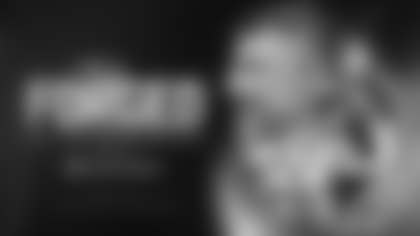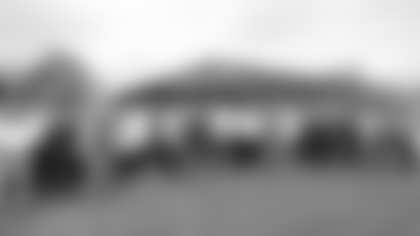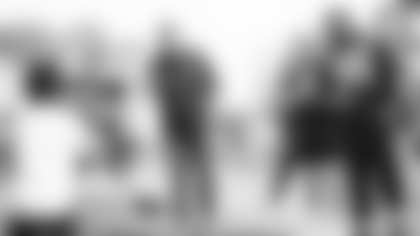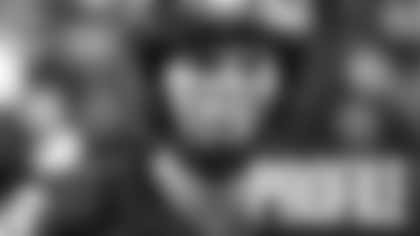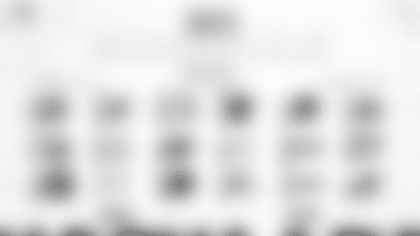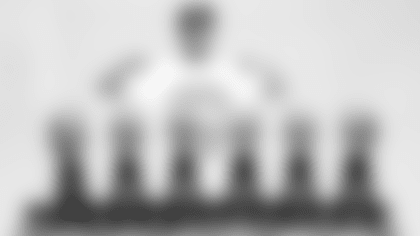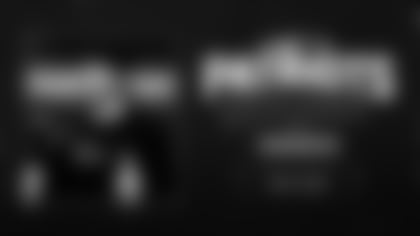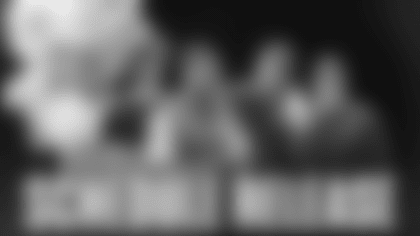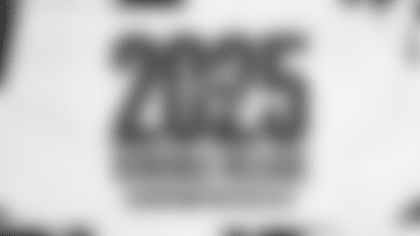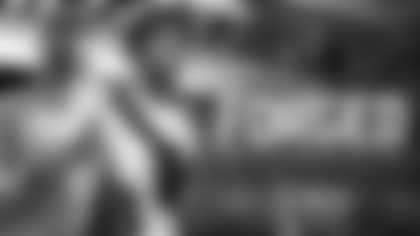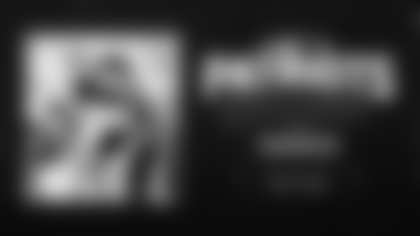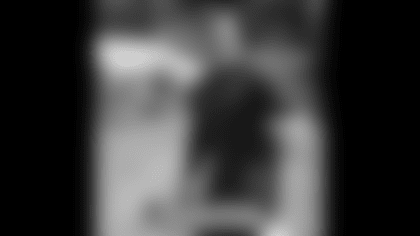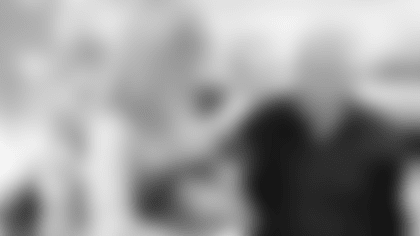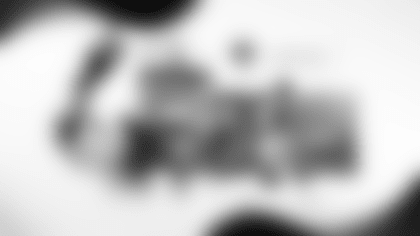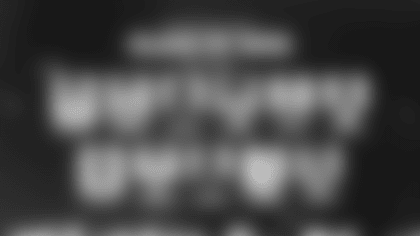BB: How's it going today? You wrapping things up on the Giants like we are? We've got another 48 hours or so. We'll go through our final preparations today, kind of review everything, hit a few situations and hopefully be ready to go Sunday afternoon.
Q: The Giants have some injury news that came out yesterday - Ahmad Bradshaw has a cracked bone in his foot, how would whether he plays or not alter your preparation?
BB: They've got several backs. They've used [D.J.] Ware for him, at times anyway, and of course [Brandon] Jacobs and [Da'Rel] Scott, so we'll be ready for all of them. Scott is really fast, Jacobs is a big guy, is a powerful guy and Ware is, I'd say, similar to Bradshaw in a lot of ways. They use him in the passing game, he's quick, he's kind of an elusive guy. I'm sure that he could do or would do some of the things that Bradshaw does. They use all those guys a little bit anyway. They're all productive so whichever ones we get, we'll be ready for.
Q: You've had a couple of weeks with Brandon Deaderick. How has he been progressing and what can he add to the defense?
BB: He's coming along. For all those guys, for Brandon, Kevin [Faulk], Marcus [Cannon], Ron [Brace] - it's kind of like training camp. They've only had a few practices, so a lot of it is extra work just getting their timing and their technique and their reactions quicker, seeing all 22 guys - something they haven't been able to do. It's like an accelerated training camp for them this late in the season. They're definitely all making progress and Brandon has done a good job. He's working hard and he's getting a lot of snaps. You can see it a little bit every day. It's still a lot of ground to make up but he's certainly closing the gap. I think all four of those guys, hopefully - we haven't really seen Marcus play - but Brandon and Ron and Kevin have all played for us in the past and I think they'll all be able to help us and we'll see how it goes with Marcus.
Q: Is Ron Brace at the point where you could possibly active him? I know the window closes in a couple of days.
BB: Yeah, we have some time there. I think he's certainly making good progress. We'll see how this week finishes up, but he's getting close.
Q: Does Ron Brace bring a different element to the defensive line than Brandon Deaderick would?
BB: They're both big players, big, physical guys. They're a little different playing style. I think Ron is more of an inside player; Brandon really has a lot of position versatility - he's played inside and outside for us. Ron played end in the 3-4 when we were in more of an odd front so he played out on the tackle too. It's just two young guys that are healthy that can give us more depth and help that group. It's good to have them out there. We'll try to get the most productive guys we can out on the field.
Q: This team has had a tendency to stay away from losing streaks over the years. Other than talent, what's the key to not letting things snowball in a negative way after a loss?
BB: I don't know. We're really trying not to talk too much about last week's game one way or another. We've won some, we've lost some, but last week is gone - it doesn't make any difference. We've had winning streaks, we've lost games. Whatever happened last week, we try to learn from it, move on and take each week as it comes and try to focus on that individual week. I don't think last week's game or the week's before game has much bearing on this game - it will be on how our preparation is this week and how we're able to collectively perform on Sunday.
Q: Each time you see the Giants across the field, whether it's the preseason or whatever, do you look back a little bit?
BB: I think you can't help but think about a team that you spent 12 years with. But again, my focus is on this game and that's really - it's about what we can do to win on Sunday. What's in the past is in the past.
Q: There are no guys still with the Giants from when you were there, right?
BB: John Mara, the owner. Frank [Mara] and Chris Mara, the Mara family. There're a few people but yeah for the most part, right, not too many. One up in the broadcast booth.
Q: How did Jerod Mayo look last week? Do you expect him to be more of an every down player? Will he be wearing the green dot?
BB: We'll get through the week here and see where everything is. He's practiced this week, he practiced last week - he's done a little bit more this week. We'll finish things up today. We have multiple guys in practice do that because we can practice it that way. Then we have to make the game decision so we have several guys in practice and then in the game we designate the people that can do it in the game. We practice it in several different ways so whoever is in there can do it. As you sub guys in and out, whoever is in the game can handle it.
Q: Do you still practice hand signals on defense in case?
BB: Yeah, you have to. Yeah sure. The equipment, sometimes it goes down or it doesn't function properly. Again there's a lot of moving parts on that, between the helmet, the sender, the receiver and there's some other, I'm not very technical but there's some other things. Something could definitely go wrong - it does go wrong so at times you have to do that, [yes].
Q: What's the situation with Dane Fletcher? Is he re-injured or is it something where you're expecting him back soon?
BB: He's doing some rehab. When he's ready, we'll be happy to have him out there. If it was going to be for the year, we would put him on Injured Reserve so we don't feel like it's that long but we'll just see how he comes along.
Q: The Giants have struggled against the rush. Do you expect to do more rushing than you did last week?
BB: Hopefully we can move the ball and score points. That's what we always try to do on offense. I don't know. You tell me what they're going to be in. [If] they come and line up 10 guys on the line of scrimmage, I don't think we want to run the ball. If they want to play coverages that are advantageous to run, we'll run. If they want to give us looks that are advantageous to pass, we'll pass. If they put everybody outside, I don't think we want to run outside. Look, you go into a game plan, you have balance in your offense but I don't think you want to say, 'There they all are, let's go, let's see what we can do against it.' I don't think that's a very good strategy. What we do will in part depend on what they do.
Q: You talked about what defenses they might be in. Is Perry Fewell more like the Giants you remember from the last time you face them or is there a lot of Buffalo stuff?
BB: I'd say it's basically Perry's defense. Are there some similarities to - Coach [waves to Jimmy Johnson who entered room] Jimmy Johnson: Thought I'd catch the last few minutes of it.
BB: Honored to have you in my presence. They run what they run. When Steve [Spagnuolo] or whoever was there, they did what they did. It's a four-man line. There are some similarities, I'm not saying that, but I'd say it's definitely Perry's system.
Q: Vince Wilfork yesterday talked about what the defensive line can do to take some of the pressure off the secondary. How do you think the defensive line has progressed this season in terms of getting to the quarterback and helping in that regard?
BB: We've had our moments. There have been times when it's been good, there are other times when we'd like for it to be better. Again, it's all about team defense. If you have a good rush and the receivers aren't covered, they catch the ball. If you cover the receivers and there's not enough rush, then the quarterback and the receivers have extra time and in this league if you give them extra time, they're going to eventually get open and hit those too. Sometimes we've had one and not the other, sometimes we've had both, sometimes we haven't. It comes down to team defense. What you want to do is you want to be closing in on the quarterback and force him to throw the ball when you have the receivers covered. That's kind of the timing of your coverage. You don't need to cover the receivers when the quarterback is on his way back into his drop, you need to cover the receivers once the quarterback gets to the end of his drop and he's ready to release the ball. That's when you have to be on them, whatever coverage you're playing - man, zone, combination, whatever it is. You try to have your rush force the quarterback to throw on time. You try to have the receivers covered based on the timing of the play, whether it's a three-step drop or a five-step drop or a seven-step drop. You try to read that and adjust the coverage. It's all tied together. You want to have a great rush. You want to have tight coverage, but you really need them both at the same time.
Q: Jason Pierre-Paul is basically a raw football player, he didn't play a lot in high school or college. Does he get by on athleticism? Is he still a raw pass rusher or have you seen his technique improve?
BB: I'd say he's improved a lot, yeah, from where he was. We played against him last year in preseason and just from last year to this year, he's a great talent, he's long, very athletic, fast, quick, he's got good power, he runs well, he makes some plays in pursuit and chase. But from a technique standpoint and just overall understanding - recognizing draws, screens, different pass sets, those kinds of things, you can see he's made a lot of improvement over the last year. He's a good football player. He's very disruptive. They play him everywhere too, which is another - even though I'm not coaching him, but it's just a sign when you see a team move a player move around that he must be catching on fairly well. He plays on our left side, he plays on our right side, he plays inside. Actually in their odd look, he actually plays on the nose when [Mathias] Kiwanuka is kind of the standup linebacker, fourth rusher. They do a lot of different things with him and I think that's definitely an indication that he's gaining experience, gaining understanding and has more of a comprehension of the defense and the different things they ask him to do. He's a very disruptive player and they put him in a lot different spots. Like I said, when you come out of the huddle offensively, you don't know for sure where he's going to be, which, there's not a lot of defensive linemen that you can say that about. Usually they play one spot or maybe two, but this guy could pretty much be anywhere.
Q: When you're in a situation where you're considering challenging, do the coaches in the booth just have access to television replay or do they have DVR capability?
BB: No, there's no DVR capability. There's a monitor in both coaches' booths and it gets the exact same feed. Whatever the networks feed it, that's what they see, which sometimes is nothing. Sometimes it's what's on the big screen. Sometimes it's what the TV shows, which may be different than what the fans in the stadium see. We try to look at all those. If we have a shot in the monitor of the play, then they look at that. I can look at it on the big screen if it's replayed. Sometimes you get a couple different looks at it, one of which is maybe the right one you're looking for, like this should or shouldn't be challenged. Sometimes you don't and that's - and then some of them are just really close and it could almost go either way. I think the big part of that is that if you're sure of it, then it's an easy challenge to make. The easiest challenge is [when], regardless of what the play is, you look at the play on the screen and it's obvious to you that the play was called incorrectly. That's no problem. The harder one is when you see the play with your own eyes and you say, 'I don't think that's the way it should have been called,' but can you find another picture of it that confirms what you actually saw? That's a question. And then there are the plays that maybe you think you have a 25 percent chance of being right on. 'Maybe we could get this. I doubt it.' But it's such a big play in the game and you maybe don't need your timeouts; it's the end of the first half or something and your timeouts aren't that critical at that point and it's a huge play in the game, then maybe you take that lesser percentage chance and say 'Okay, we didn't see the play, we didn't get a real good look at it, but we think it's close. Let's take a shot at it.' Was his arm going forward? Was the ball out? Was it a fumble? Was it an incomplete pass? That kind of thing. It doesn't get replayed up there, but it's a big play in the game, then maybe you just take a shot at it and say, 'I hope it comes out in our favor.'
Q: Was the DVR subject something that was ever brought up or did I hear that incorrectly somewhere else?
BB: I'm not aware of any DVR system that's ever been in place. The only thing you ever have in the [coaches] box is what the monitor is up there. No coach has an individual monitor. You can't have your own TV or you know - both booths have to be the same. Whatever is fed into the one booth gets fed into the other booth, so there's not any competitive advantage between being at home or having your own equipment or any of that. It's all the same. But as a coach, you're kind of at the mercy of that because you don't really know. From one play to the next, you don't know what you have to work with. So if they don't replay it - no matter what shot they have - if they don't replay it then you can't make a decision based on it. Sometimes you make a challenge and then you see the play replayed. There's the challenge, the officials go over there, there's a pause in the action and then they play something up on the screen and you haven't seen that and you're looking at it and going 'There's no point in challenging that play, we're not going to get this,' but you hadn't seen that before.


